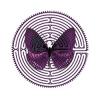BIRTH ORDER: The reflective nature of the theory

This article was published in The Mindful Word journal of engaged living (http://www.themindfulword.org)
I’ve never felt the analogy, “You never know what you’ve got until its gone” to be more true in the case of siblings. Older or younger, until they disappear from our lives for a brief or extended period of time, we don’t realize how essential they are in the framing of our core self. Even if you are years apart, there’s often a connection that cannot be explained. You hear of families who go for months, years or even a lifetime of not talking to their sibling, but can often pick up right where they left off whether its cracking loving jokes, arguing or fighting constantly or just sitting in silence, assuming the roles set out to you by your family and birth order.
In psychological studies, birth order is studied in terms of actual birth order (ABO), the numerical order in which you’re born in your family (i.e. oldest, middle youngest), and psychological birth order (PBO), the individual’s self perceived birth order in the family. Thus, our actual birth order need not have the same impact on you as the birth order you believe you have. Actual and psychological birth order can deviate for a number of reasons, including illness of one child, size of family and degree of separation between siblings. Your role in the family based on your age may not be same as the role you’ve come to occupy.
According to Alfred Adler, the pioneer of individual psychology and birth order, each child has a profile, based on the order in which they’re born. Both firstborn and only children (or one with the “oldest” role) would be most likely to take on a leadership position, sticking to rules and order and striving towards achievement goals. Concurrently, the middle child also feels slightly robbed of the prized youngest child status and is often stereotyped as lacking confidence and being very secretive about their thoughts and feelings. The youngest child may feel less capable and experienced, and perhaps is a bit pampered by parents and even older siblings. As a result, the youngest may develop social skills that will get other people to do things for them, contributing to their image as charming and popular.
Though there’s a great deal of merit in the study of birth order, I think that the sibling connection goes much deeper than that. Even though siblings might display certain traits, it’s more based on the individual and their personality. In my family, even though my brother is extremely outgoing and social, I’d also argue that his ability to be a leader and his inclinations towards rules and order is much more pronounced than mine. Despite being three years younger than me, I often look to him for advice and guidance, as he has a great deal of wisdom for someone in their very early twenties. If I were to look at the classifications for each child, my personality and role in the family would most resemble that of a middle child as I’m very quiet and don’t typically express my feelings or thoughts.
Interested in finding out your birth order personality? Click here>>
image: Vanessa Kay(Creative Commons BY)
The post BIRTH ORDER: The reflective nature of the theory appeared first on The Mindful Word.
Sign up for a free subscription to The Mindful Word’s quarterly digital magazine at http://www.themindfulword.org/subscribe
Source: http://www.themindfulword.org/2013/birth-order-reflective-nature-theory/
Anyone can join.
Anyone can contribute.
Anyone can become informed about their world.
"United We Stand" Click Here To Create Your Personal Citizen Journalist Account Today, Be Sure To Invite Your Friends.
Please Help Support BeforeitsNews by trying our Natural Health Products below!
Order by Phone at 888-809-8385 or online at https://mitocopper.com M - F 9am to 5pm EST
Order by Phone at 866-388-7003 or online at https://www.herbanomic.com M - F 9am to 5pm EST
Order by Phone at 866-388-7003 or online at https://www.herbanomics.com M - F 9am to 5pm EST
Humic & Fulvic Trace Minerals Complex - Nature's most important supplement! Vivid Dreams again!
HNEX HydroNano EXtracellular Water - Improve immune system health and reduce inflammation.
Ultimate Clinical Potency Curcumin - Natural pain relief, reduce inflammation and so much more.
MitoCopper - Bioavailable Copper destroys pathogens and gives you more energy. (See Blood Video)
Oxy Powder - Natural Colon Cleanser! Cleans out toxic buildup with oxygen!
Nascent Iodine - Promotes detoxification, mental focus and thyroid health.
Smart Meter Cover - Reduces Smart Meter radiation by 96%! (See Video).





